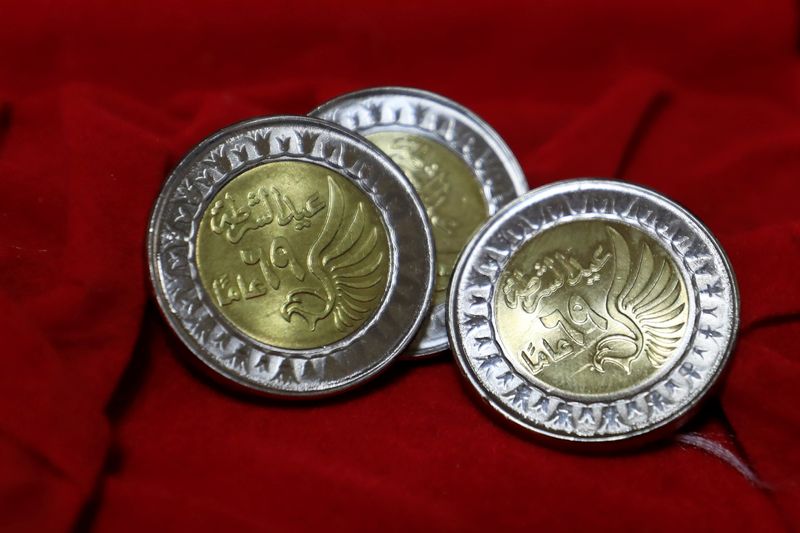Egyptian pound drops nearly 14% after Ukraine war prompts dollar

© Reuters. FILE PHOTO: Coins of a one Egyptian pound are seen at the Mint Museum to mark police day which falls on January 25, the anniversary of the country’s 2011 uprising, in Cairo, Egypt January 25, 2021. REUTERS/Amr Abdallah Dalsh
By Patrick Werr and Nadine Awadalla
CAIRO (Reuters) – Egypt’s pound depreciated by almost 14% on Monday after weeks of pressure on the currency as foreign investors pulled out billions of dollars from Egyptian treasury markets following Russia’s invasion of Ukraine.
The pound dropped to 18.17-18.27 against the dollar, Refinitiv data showed, after having traded at around 15.7 pounds to the dollar since November 2020.
The central bank also hiked overnight interest rates by 100 basis points in a surprise monetary policy meeting.
Egypt has been in discussions with the International Monetary Fund about possible assistance, people close to the negotiations have said, but it has not announced any formal request.
“This is a good move to make as the devaluation of the pound moves it roughly in line with its fair value and it could pave the way for a new IMF deal,” said James Swanston of Capital Economics.
“However, it will be key whether policymakers now allow the pound to float more freely or continue to manage it and allow external imbalances to build up once more, possibly resulting in future step devaluations like today’s in the future.”
The IMF in Cairo was not immediately available for comment.
Monday’s weakening of the pound could catalyse inflows of foreign currency, while investors who already had money in Egyptian treasuries would be unlikely to sell now, said Farouk Soussa, senior economist at Goldman Sachs (NYSE:).
“The move is designed to trap liquidity in the market and bring in investors who might be sitting on the sidelines waiting for the pound to bottom out,” he said.
But it would also likely add to inflation and possible local dollarisation.
“The big question is whether this is enough, or if more might be needed to entice portfolio investors,” Soussa said.
HIGHER WHEAT IMPORT PRICES
Shortages of dollars have led to blockages at Egyptian ports, after importers could not obtain necessary foreign currency for letters of credit to get their goods cleared, bankers said.
The war in Ukraine has also left Egypt facing higher costs for its substantial wheat import needs as well as a loss in tourism revenue from Russian and Ukrainian visitors to Red Sea resorts. Russia and Ukraine are the main suppliers of wheat to Egypt, which is often the world’s largest importer.
The higher wheat prices could nearly double annual state spending on wheat imports to $5.7 billion, according to a study last week by the International Food Policy Research Institute, straining government finances and fuelling inflation pressure.
Headline inflation has accelerated to its highest level in nearly three years, registering 8.8% last month and touching the upper limit of the central bank’s 5-9% target range.
Prime Minister…
Read More: Egyptian pound drops nearly 14% after Ukraine war prompts dollar
